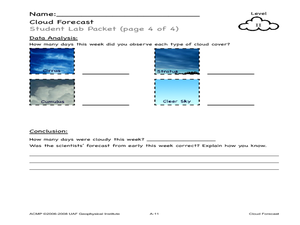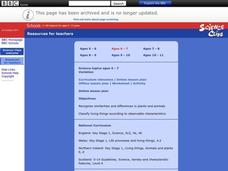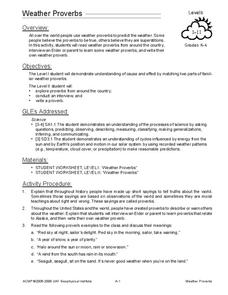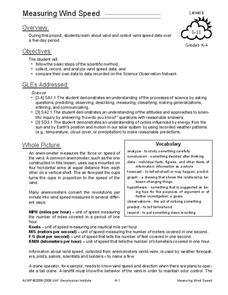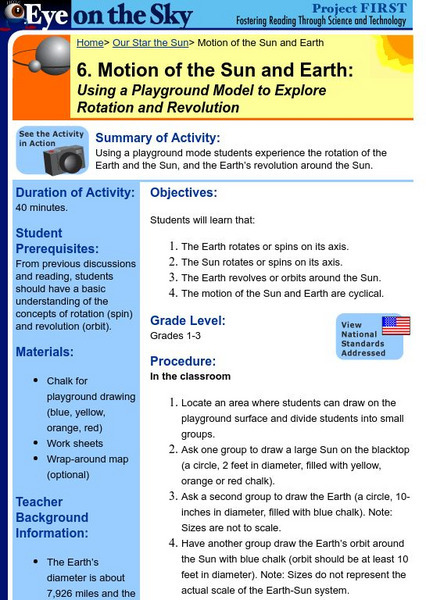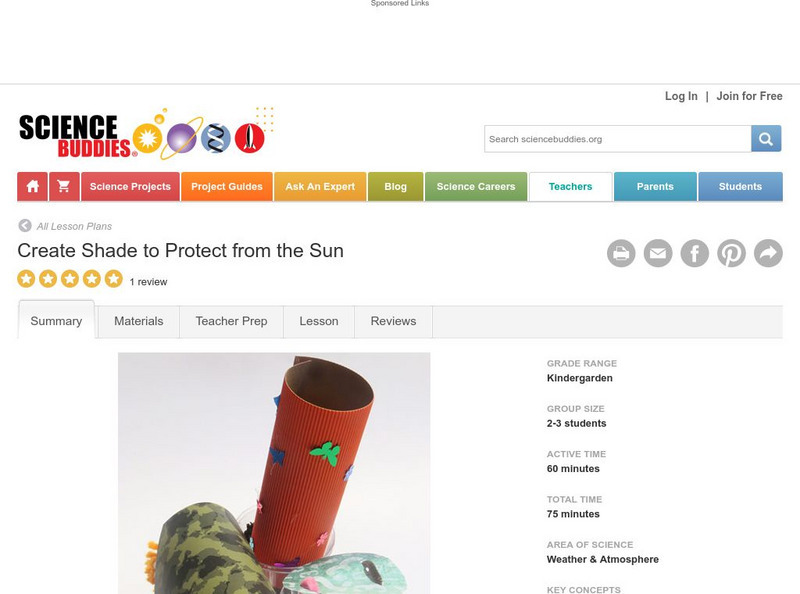Curated OER
Growing Plants
Learners explore plants and recognize that they are living things that require light and water to grow. In this online plant biology instructional activity, students identify, name and match the parts of plants. Extension activities and...
Curated OER
Pushes and Pulls
Students examine different types of movement and causes that may affect those movements. In this online interactive forces and motion activity, students use toy cars to observe push and pull and then make predictions and collect data...
Curated OER
If I Were A Raindrop!
Students review the water cycle. In this water cycle lesson, students review the different stages of the water cycle. Students use the computer program Kid Pix Weather to help demonstrate understanding.
Curated OER
Finding Out About the Stars and Planets
Learners complete a web-based activity to study the planets and solar system. Students complete a number of activities including a slide show that depict the true facts about planets.
Curated OER
The Gifts of Trees
Students examine the various things trees give us. They read the book, "The Giving Tree" by Shel Silverstein, cook a food using a tree fruit, create notepads using unused paper, construct a picture frame with twigs, and write a poem.
Curated OER
Sky Stories Curriculum
Students investigate the stories told by ancient cultures about the constellations. They listen to stories told by the Greeks and Romans. The classroom should have posters of constellations for the lesson plan and the teacher performs...
Curated OER
Cloud Forecast
Young scholars record weather observations and research online weather data. In this weather observations lesson, students study the cloud cover for several days and record their observations in a chart. Young scholars identify the cloud...
Curated OER
Ourselves
Students use a website to name and compare external body parts of humans and other animals.
Curated OER
Sound and Hearing - Internet Research
Students use a website to help them recognize that sound is generated in a variety of ways and from different sources. They determine that sounds vary in tone and loudness, and learn there are different ways to describe sound.
Curated OER
Variation
Learners participate in an online lesson to reinforce the similarities and differences in plants and animals. They classify living things according to observable characteristics.
Curated OER
Environment
Students examine the energy saving benefits of trees. They identify ways in which trees reduce air pollution. They also work together to solve problems related to pollution.
Curated OER
Day and Night
Good Night, Moon is a classic little ones absolutely love. It's a sweet book that can be used, as in this lesson plan, to start a conversation about the difference between night and day. After reading the story, the class brainstorms...
Curated OER
Weather Proverbs
Your class explores weather proverbs and superstitions from around the country and writes their own proverb about weather. They interview community elders to learn proverbs about Alaska and its weather. Then they discuss several example...
Curated OER
Sunshine and Shadows
Students measure their shadows early in the morning, record direction of shadow, make marks in ground with chalk or tape, measure with ruler, and record results. Students repeat process at noon, and then later in afternoon. Students...
Curated OER
Measuring Wind Speed
Students study wind speed and collect wind speed data. In this wind speed lesson, students visit a website to learn about the local wind speed forecast for their week. Students discuss wind and wind speed. Students collect wind speed...
Curated OER
Weather Report Chart
Students complete a weather report chart after studying weather patterns for a period of time. In this weather report lesson, students measure temperature, precipitation, cloud cover, wind speed, and wind direction for a month. Students...
National Museums Liverpool
Liverpool Museums: The Sun Tracker
This simulation allows the user to see the sun's arc in the sky anywhere in the world at any time. By changing the season settings the user can see how seasons affect the height of the sun's arc.
Other
Massachusetts Department of Education: Sunlight Warms Earth's Surface
This unit contains a series of lessons that allow young scholars to explore the effect of sunlight on Earth's natural surfaces of sand, soil, rock, and water. In addition, students explore how the color and material of a surface affects...
Other
Center for Science Education: Eye on the Sky: Motion of the Sun and Earth
Students model the interaction of the earth and the sun. The activity is designed for the playground. You will need chalk, but all the other worksheets are provided.
Science Buddies
Science Buddies: Create Shade to Protect From the Sun
In this fun activity, students will get creative with craft materials. They will figure out how to protect an "animal" and its territory from getting too hot in the sun. What will they build to keep their animals cool?
E-learning for Kids
E Learning for Kids: Science: Rio De Janeiro: Day and Night: The Sun
Gabriella lives in Rio de Janeiro, Brazil. Help her learn more about the sun and identify the properties of the sun.
Other
Center for Science Education: Eye on the Sky: What Makes Day and Night?
This activity will allow you to model day and night cycles. A rotating student holding a map (provided) models the earth. A lamp is used to model the sun. Numerous worksheets (pdf) and additional website resources are also provided.
PBS
Pbs Kids: Science Rocks: Build a Tent
This site provides instructions on how to build a tent including materials needed. It focuses primarily on a model tent but gives hints to adapt it to an outdoor tent that could provide shelter from the weather.
Harvard University
Harvard Smithsonian: Everyday Classroom Tools
The focus of this series of lessons is to engage students in an exploration of the world around them. The emphasis is on inquiry as students learn about the earth, sun, light, shapes and more.








